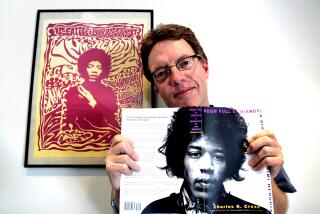George C. Chesbro dies at 68; wrote offbeat detective novels
George C. Chesbro, a prolific writer who mixed science fiction and fantasy into private-eye novels, many featuring a dwarf detective as the main character, died of congestive heart failure Nov. 18 at St. Peter’s Hospital in Albany, N.Y. He was 68.
Considered by fans to be one of the field’s most wildly inventive writers, Chesbro had 27 novels published and was one of the few critically successful crossover acts in modern crime writing. He was described by Playboy magazine as “Raymond Chandler meets Stephen King by way of Alice’s looking glass.”
Chesbro’s best-known character “is definitely an acquired taste that requires certain suspensions of perception and expectation,” wrote Dick Adler in a 1993 Chicago Tribune review.
“Imagine a dwarf who honed his physical skills as a circus acrobat called Mongo the Magnificent and then, using his real name, Dr. Robert Frederickson, became a world-famous criminologist,” Adler wrote. “Add to that the fact that Mongo’s world is filled with good and bad witches, Satanists, warlocks and magicians of every shade as well as the normal run of murderers, swindlers and thieves.”
The writing, nonstop and violent, can also be very funny. Mongo played on a local softball team in his spare time and noted that he led the league in walks.
Chesbro, a special-education teacher for 17 years, came up with the idea of a detective with a physical disability after musing on the popularity of fictional TV detectives who used a wheelchair (in “Ironside”) or were blind (in “Longstreet”).
“Out of nowhere, believing that it is good for the soul to have one insane idea a day, whether you need it or not, the notion of a dwarf private detective came to me,” he told the website for Milwaukee’s Mystery One bookstore. “The thought certainly amused me, but I considered such a character bizarre and absurd, unworkable and unpublishable. . . . I kept searching but the damn dwarf just wouldn’t go away.”
Trying to “exorcise” the character, Chesbro started a novelette that he intended to be a satire. Halfway through, he realized the key to the protagonist was a simple quest to be taken seriously. “That touched me, and I started over again, this time doing it ‘straight.’ . . . I gave Mongo dignity and in return he gave me a career.”
It was a career that started part time, while the native of Washington, D.C., was an undergraduate at Syracuse University. He had been a high school swim team captain and class president in upstate New York, but he struggled with questions of self-worth, said Robin Chesbro, a childhood friend who became his third wife.
After graduation, Chesbro taught and worked with emotionally troubled teens at the Rockland (N.Y.) Psychiatric Center. He published his first poem at age 27 for $1 and his first short story when he was 29.
The novel “Shadow of a Broken Man” (1977), starring Mongo, proved to be his breakout hit. He kept his day job through several more books, and later, during lean times, he worked as a night security guard. He wrote screenplays and books under the pen name David Cross, published more than 100 short stories and sold book reviews and articles on the art of writing. He was a president of the Mystery Writers of America.
His novels include “City of Whispering Stone” (1978), “An Affair of Sorcerers” (1979), “The Beasts of Valhalla” (1985), “Second Horseman Out of Eden” (1989), “Bleeding in the Eye of a Brainstorm” (1995) and “Dream of a Falling Eagle” (1996).
His books were strong sellers for two decades and then went out of print in 1996. Chesbro acquired the rights and, with his wife, put most back into print through their Apache Beach Publications.
His marriages to Donna Troch and Oranus Ravar ended in divorce.
In addition to Robin Chesbro, his wife of 11 years, of New Baltimore, N.Y., survivors include two children from his first marriage, Mark Chesbro of Thayer, Okla., and Michaele Chesbro of Boise, Idaho; and two stepdaughters, Rachael Gass of Boise and Leah Gass of Scottsdale, Ariz.
Sullivan writes for the Washington Post.
More to Read
Start your day right
Sign up for Essential California for the L.A. Times biggest news, features and recommendations in your inbox six days a week.
You may occasionally receive promotional content from the Los Angeles Times.






